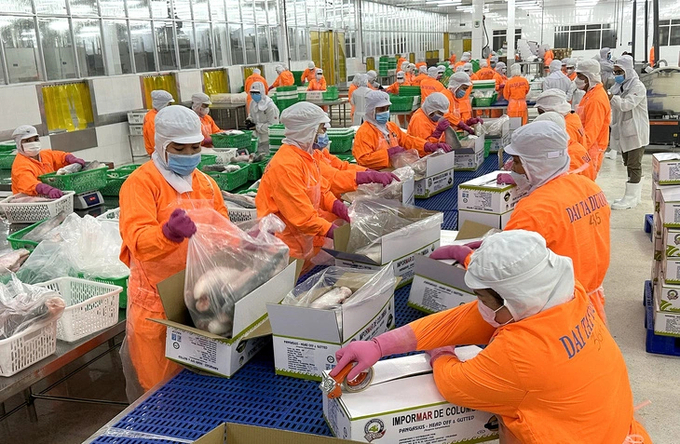November 26, 2025 | 14:00 GMT +7
November 26, 2025 | 14:00 GMT +7
Hotline: 0913.378.918
November 26, 2025 | 14:00 GMT +7
Hotline: 0913.378.918

Pangasius fillets are processed and packaged for export to the US. Photo: Thao Thuong.
On May 8, Washington time, the US Department of Commerce (DOC) held an online hearing about reviewing the application to recognize Vietnam's market economy status.
The representative of the Vietnamese Government clearly stated arguments, information, and data confirming that the Vietnamese economy completely meets the six criteria of market economy regulations according to US law.
At the same time, it emphasized that Vietnam's economy has developed more rapidly than many economies we have recognized with market economy status in the past decade.
Vietnam has signed over 90 bilateral trade agreements and about 60 investment promotion and protection agreements. Vietnam is also a member of 16 free trade agreements (FTAs) with the participation of about 60 economies.
Among them, many new generation FTAs such as CPTPP and EVFTA meet high standards on trade in goods and services as well as labor and environment, helping to make the mechanism for resolving investment and state-owned enterprise disputes transparent.
Since 2008, Vietnam and the US have established the Structural Issues Working Group (SIWG) and have held ten technical meetings to exchange information according to the six criteria set by the US, helping to update vital developments of the Vietnamese economy.
From there, it created a foundation for the US to recognize and reconsider Vietnam's market economy issue.
Criteria include Currency conversion level, Issues of salary and wage negotiation between employees and employers, Level of foreign investment in economic activities, Issues of state ownership and private ownership, The degree of government control over specific resources, prices, and other factors.
The Trade Remedies Authority of Vietnam (MOIT) said that one of the positive changes in Vietnam is the openness of the economy, trade policy, monetary policy, foreign investment, and technological advances Integration work.
Vietnam's exports to the US tend to increase. Total turnover in 2023 reaches USD 97 billion; the first four months of 2024 are estimated to reach USD 34.12 billion.
The MOIT assesses that the US recognition of the market economy mechanism will help Vietnamese goods compete equally with other countries when the trade defense tax rate accurately reflects production practices in Vietnam, which contributes to concretizing the commitments of the two countries' senior leaders, strengthening the Vietnam - US comprehensive strategic partnership.
Mr. Do Ngoc Hung, Commercial Counselor, Head of the Vietnam Trade Office in the US, commented that the period from now until July 26, when the US makes an official decision, will be critical, requiring coordination. The most vital and drastic actions at all levels are through many channels.
Mr. Hung called on relevant parties to quickly provide information to partners to share benefits with Vietnam, helping to convey information systematically and thoroughly on this issue.
Translated by Huong Giang

(VAN) Thanh Hoa province has substantial potential to supply carbon credits, opening opportunities for green economic development, enhancing agriculture and forestry value.
/2025/11/25/1741-0-nongnghiep-221736.jpg)
(VAN) The application of AI helps identify emission sources and assess air pollution developments, thereby supporting management agencies in issuing timely and appropriate control policies.

(VAN) Viet Nam will develop its carbon market not only by prioritizing transaction volumes but also by transitioning to a low-emission economy.
/2025/11/25/3413-1-171953_261.jpg)
(VAN) Experts from the Vietnam Academy of Science and Technology have conducted surveys to identify the causes of landslides in Lam Dong province and propose natural disaster prevention solutions.

(VAN) The HNT reservoir operation support system, developed by WeatherPlus in collaboration with Kyushu Electric Power, enables real-time rainfall forecasting, inflow forecasting, and flood-release simulations.

(VAN) Dr. Cao Duc Phat stated that the localization of early natural disaster warning technologies will help meet practical requirements and create favorable conditions for domestic research institutions and businesses to develop.

(VAN) In addition to improving early-warning technologies, there is a need for software that can guide response actions, track community evacuations, and manage safe zones through digital mapping.